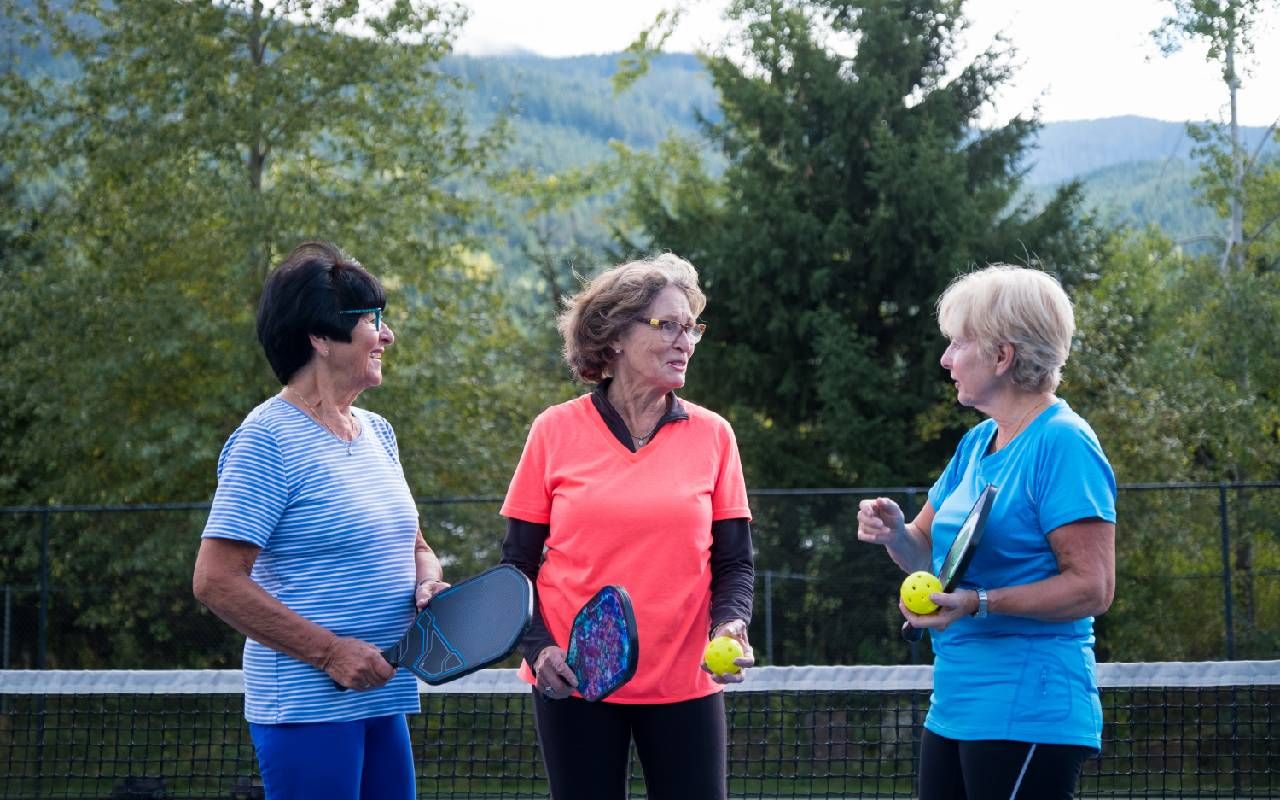The Surprising Benefits of Asking for Help
Why we resist, how to shift our perspective and what happens when we do
There are three little words many of us avoid stringing together, even when we are at our lowest point. "Can you help?"
After breaking an ankle playing pickleball, a minor incident in the scheme of things, I was embarrassed about being unable to get around on my own. It was easy enough to ask my son to place a non-slip chair inside the shower; harder to call him to pull my naked body out when I couldn't hoist myself up, and crutches glided across the wet tile floor like a hockey puck. (Google said remove bathroom rugs!) Three things stopped me from screaming for assistance: independence, ego and fear.

I survived and quickly realized it was time to swallow my pride and get assistance. When asking friends, family or strangers to assist with small or large chores, nobody seemed bothered or put out; not one person "shamed" me or tried to make me feel inadequate.
While asking for help may come naturally to some, for most people, relying on others is a resiliency skill to learn.
We know from research that acts of altruism, providing aid without expecting anything in return, facilitate people in living happier and more satisfactory lives. In one recent study, Stanford social psychologist and research scientist Xuan Zhao found, "We underestimate just how willing people want to assist others and how positive they feel about doing so."
While asking for help may come naturally to some, for most people, relying on others is a resiliency skill to learn. As an executive/life coach, it can be easier to advocate for others in finding ways to move forward than apply the same principles to me.
With numerous clients and friends experiencing similar issues, I wanted to uncover the reason(s) for resistance in the first place. So, I reached out to several psychologists and discovered a myriad of explanations, generally starting early in life and running deep to the core of our identity.
Being Independent and Caring for Others Begins in Childhood
Playing make-believe, whether caring for dolls or running around the house dressed as a superhero, pretending to be in charge is often baked into the fabric of our lives from when we were little kids.
"In our generation, girls were raised to care for others, so asking for help creates a little friction," said Lisa Honig Buksbaum, CEO and founder of Soaringwords.org. And for boys, she continued, parents tended to encourage holding in emotions, ultimately resulting in what she called "toxic masculinity."
"There was no roadmap for giving and needing help at the same time."
Growing up with narcissism is another common reason people find it hard to trust others and themselves. It is easy to stay inward if you don't know how a parent or loved one may react to your needs or feel inadequate or invalidated when expressing your emotions.
According to Julia Baum, a private therapist in New York and California, "For many who have experienced others' needs routinely coming first, these individuals may adopt a mindset of shame, questioning their self-worth, feeling guilty when asking people for their time, energy or resources."
Examples of frequent messages Baum hears:
"I should be able to do this on my own." Or "I'm worth less now since I can't do as much as before." And another prevalent emotion fueled by guilt, "I'll be a burden to others." With these negative thoughts circling in one's mind, Baum explained, "This outlook can be really limiting when you do need help."
And then there are other times when the cloak of responsibility is necessary, as for Amy Rogers. Rogers' mom passed away when she and her two younger siblings were still school-aged, and her role immediately went from "big sister" to "matriarch." By age 16 and with a car, she recalls driving her brother and sister to school and shouldering many of the family's caregiving needs.
"Taking everything on was just what I did back then," said Rogers. "There was no roadmap for giving and needing help at the same time."
Using Misfortune as a Catalyst for Change
It often takes an unfortunate event where we find ourselves requiring assistance from others yet unprepared to ask for what we need.
Beth Glassman was 54 when she woke one evening, sure she was dying from unexplained abdominal pain. After learning she had a rare form of non-metastasizing cancer called Desmoid-Type Aggressive Fibromatosis, which would require surgery at Mayo Clinic in Rochester, Minnesota (a 45-minute drive from home), Glassman said, "Right away, I knew I was going to need a lot of support. But I had no idea how to ask."
"I heard a thunderclap when I needed a ride to a colonoscopy, and I didn't have anyone to call."
When Margaret Ghielmetti's mom fell ill years ago, she donned a cape and halo and became her sole caretaker. Ghielmetti, author of "Brave-ish: A Memoir of a Recovering Perfectionist," described how difficult it was to come to terms with turning to others in a time of need. She joked she was given the "Davis Family Handbook" at birth. One of the first rules, "If you want it done right, do it yourself. Actually, do it yourself, no matter what. Preferably yesterday, perfectly, without any help."
And for Rogers, single and in her 60s during the height of the COVID pandemic, life became complicated once again. After living several states away from both siblings for years, Rogers remarked, "I heard a thunderclap when I needed a ride to a colonoscopy, and I didn't have anyone to call."
How to Ask: Start Small and Be Specific
Shifting roles, being the asker versus the doer, can feel like learning a foreign language. Moreover, cultural norms may be deeply rooted, yet wanting to respect and overcome them.
A question I ask clients is, "Who could you ask to help?" One of the first steps is to write down the friends, family or community resources available to you should the need arise. Next, pull one person from the list and start with a small request, being as specific as possible and at a time when the stakes aren't as high as they can be during a crisis.
Glassman (not a client) did precisely that and created a "Cabinet," asking people to play certain roles during her recovery. For example, she requested two individuals to serve as her "Executive Team," designed to provide updates and answer questions about how she was doing. Other members were named "Directors of Homeland Security," who focused on managing visitors and her household needs. Leveraging humor is a great coping mechanism and can make asking a little lighter!
Here are a few suggestions to try where you likely will get a "yes" response.
- Can you grab my mail or newspaper on X day(s)?
- Can you get a few items for me when you are at the grocery store?
- Could you pick up my kids/grandkids after school tomorrow at 3:00 p.m.?
Like with most things, the more you practice asking for (and receiving) support, the easier and more natural it will become.
Preparing for Rejection and Revising the Narrative
We've probably all at one point been on the other side of "no." Sometimes, it can feel like strangers are kinder than the ones we know and love. This is where self-esteem and confidence are critical in not taking rejection personally. In these cases, I tell myself one never knows what is happening behind closed doors. Specifically, people may be experiencing personal or work-related issues that we are not privy to. We may never know why someone didn't readily agree, and that's OK.
Baum reminded me, "Your value is not dependent on your autonomy or independence. Try repeating a mantra such as, 'I'm worthy of help.'" And if the first person you asked declined your request, ask someone else.
"I knew how much satisfaction I got from showing my love for others. I didn't want to withhold that gift from one more person."
Another perspective Buksbaum provided is that you may inadvertently insult a loved one by not asking for support. Consider how you would answer the following: "How would I respond if X asked me for support?"; "How did I feel when X asked me to help them?" And, "How would I feel if they didn't?"
The answers might depend on who and what was asked for, but in general, individuals are pleased to have been sought out in the first place. In a Stanford News Q&A, Zhao suggested, "A direct request…enables kindness and unlocks opportunities for positive social connections." Furthermore, Zhao said asking for what you need can create an emotional closeness while showing another person you trust them enough to be there for you.
Letting Ourselves Be Vulnerable
What often goes unmentioned is how one good deed can impact both people's lives when doing so, ranging from a simple sense of satisfaction to changing life's trajectory.
Even with planning, there may be times when you have to put yourself out there and hope for the best. After her "aha moment," Rogers called her siblings, telling them, "The isolation of the pandemic is going to kill me."
Her sister, Julie, and Julie's husband then quickly moved Rogers from North Carolina to Florida. Unfortunately, Julie's spouse passed away soon after the eldest Rogers moved to town. Both sisters expressed how grateful they are to have one another close, to enjoy each other's company, and to deal with the ups and downs that come their way.
Estranged for years, Glassman used her time at Mayo Clinic to reconnect with her brother, who lived nearby with his family. "Four years later, we still talk almost every day. We have a very close relationship that we never had before."
For Ghielmetti, she recalls desperately trying to keep her mom alive by managing her every need, although other people offered their services. A friend told her, "You are denying others the blessing of caring for you and your mom." Ghielmetti said that it was at that moment that everything shifted for her. "I knew how much satisfaction I got from showing my love for others. I didn't want to withhold that gift from one more person."
Because of Ghielmetti's family handbook, she needed to secure her mother's permission before bringing on additional assistance. While her mom resisted initially, Ghielmetti believes she and her mom shared experiences they wouldn't have had otherwise: "I went from her exclusive caregiver to being truly present as a daughter and friend, which we both wanted. If I'd stayed stuck in only doing things for her, I'd have missed out on being with her instead."
Lastly, Buksbaum credits her parents and their role modeling for her desire to build a non-profit organization that has assisted more than 500,000 individuals since 2000. "Both my maternal grandparents were deaf, so I learned at a young age the importance of respecting elders, running errands, or making a meal for others," she said.
Later, when her father developed several illnesses, Buksbaum served as her parents' emotional support and a death doula for the final weeks of her dad's life.
So, the next time you need support and feel hesitant to lean on others, pick up the phone and ask yourself, "Who's helping who?"


